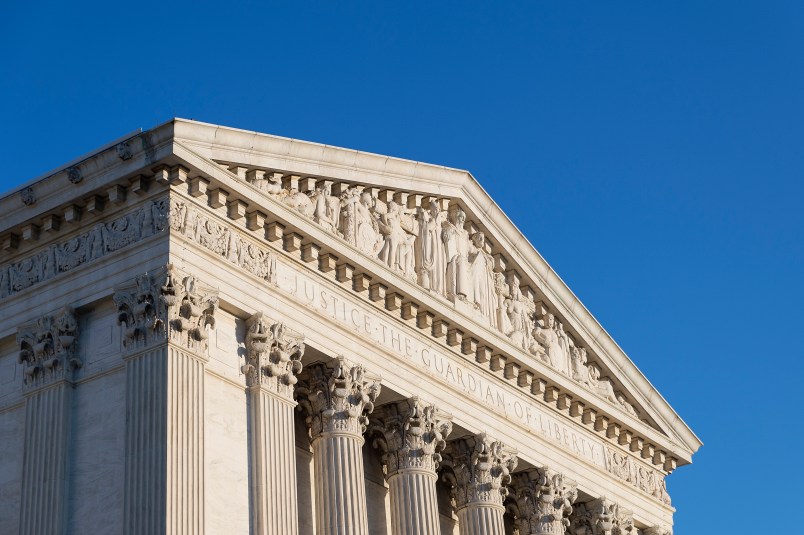The liberal contingent of the Supreme Court sounded off during Wednesday’s oral arguments about the legality of Louisiana’s abortion regulation law, which is nearly identical to a Texas law the court struck down two years ago.
What’s changed since then is the composition of the Court, which has shifted to the right since Justice Anthony Kennedy’s 2018 departure. Kennedy had joined the liberals in ruling against the Texas law in the 2016 case Whole Woman’s Health v. Hellerstedt.
But Wednesday, despite the almost certain coming loss for abortions rights advocates at the hands of Justice Neil Gorsuch and Brett Kavanaugh — along with the old conservative guard — the liberal justices spent much of the hour-long hearing jumping up and down on the state’s arguments.
Justice Stephen Breyer, who voted to strike down the Texas law, got particularly exasperated as the proceedings continued, bashing Department of Justice Deputy Solicitor Jeffrey Wall for helping bring a case before the court that they virtually already decided.
“If you really want us to go back and reexamine this, let’s go back and reexamine Marbury v. Madison!” he exclaimed, referring to the Court’s landmark 1803 decision. “You have good arguments — but why depart from what’s pretty clear precedent?”
“I don’t want to go back to 1789,” Wall responded before Breyer cut in: “You want to go back 40 years!” he said, presumably referencing Roe v. Wade, the decision that legalized abortion nationwide.
The other liberal justices more subtly conveyed their vexation with the case.
Throughout the proceedings, Justice Ruth Bader Ginsburg hammered the law’s “admitting privileges” provision, which requires the hospital be within 30 miles of the clinic. Ginsburg pointed out that the distance from the clinic bears “no relationship” to where the woman lives; the plaintiffs argued that women who do experience complications from abortions most often experience them from their homes, after the procedure.
“I think everybody also agrees that the most likely place a woman will be if she needs to be in a hospital, she’ll be at home,” Ginsburg said at one point, interrupting Wall. “It’s starting at the clinic, where she won’t be.”
The admitting privileges requirement was central to the 2016 Texas case as well.
Proponents say the requirement makes women safer. Opponents point to the scores of abortion clinics that have shuttered due to the imposition of the requirement, adding that abortions are a safe and non-surgical procedure which rarely require subsequent hospitalization. In addition, hospitals, by nature, take patients in states of emergency whether or not the doctor who performed the initial procedure is on staff.
The requirement, along with the other regulations red states have sought to impose on clinics, stands to force many abortion providers to close.
Justice Sonia Sotomayor brought up the possible burden to women such a limited number of abortion clinics would pose.
“Are you taking the position that there is no woman in Louisiana that feels burdened by this law?” she asked Wall incredulously. “There’s going to be some woman who lives 330 miles away, who is going to say that’s an unusually long period of time for me to have to drive and then drive back the same day.”
The conservative justices spoke much less. Justice Brett Kavanaugh asked about the legality of admitting privileges in general and Justice Samuel Alito brought up the question of standing, that doctors can sue on behalf of their clients.
“That’s amazing,” Alito said as Julie Rikelman, attorney for the abortion clinic that sued the state, made her case. He called the interests of the doctor “directly contrary” the those of the patients.
Chief Justice John Roberts, whose vote is being closely watched, also had little to ask. But he did appear focused on how the effect of the admitting privileges requirement would differ between Texas and Louisiana. It was unclear if his question was an indication that he was uncomfortable with the court reversing course from the Texas case. He’s the most natural candidate to cross the ideological aisle, now that Kennedy has retired.
As protesters from both camps mobbed the steps outside, Breyer drifted off on a tangent that perhaps most neatly captured the forces at work both inside and outside the courtroom.
“There are good arguments on both sides,” he said, adding that some feel abortion is “morally wrong.”
“I think personally the Court is struggling with the problem of: what kind of rule of law do you have in a country with both kinds of people?”







If you feel abortion is a moral wrong then don’t have one. Leave others alone, unless you plan on raising that child.
Conservatives exhibit great concern up until a child needs support, medical care, shelter, food, and to be free of being locked up in cages.
I hope these southern states plan to massively boost their funding for family services and adoption clinics. Because I suspect they’re going to be finding abandoned newborns on every library and fire station stoop in the state.
Since the court has decided to take this up the decision must be published this summer. No sitting on this until after November.